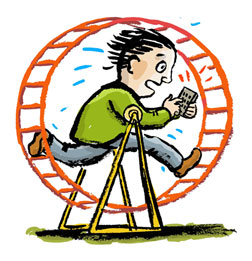
Seeking. You can't stop doing it. Sometimes it feels as if the basic drives for food, sex, and sleep have been overridden by a new need for endless nuggets of electronic information. We are so insatiably curious that we gather data even if it gets us in trouble. Google searches are becoming a cause of mistrials as jurors, after hearing testimony, ignore judges' instructions and go look up facts for themselves. We search for information we don't even care about. Nina Shen Rastogi confessed in Double X, "My boyfriend has threatened to break up with me if I keep whipping out my iPhone to look up random facts about celebrities when we're out to dinner." We reach the point that we wonder about our sanity. Virginia Heffernan in the New York Times said she became so obsessed with Twitter posts about the Henry Louis Gates Jr. arrest that she spent days "refreshing my search like a drugged monkey."

PRINT
DISCUSS
E-MAIL
RSS
RECOMMEND...
SINGLE PAGE
We actually resemble nothing so much as those legendary lab rats that endlessly pressed a lever to give themselves a little electrical jolt to the brain. While we tap, tap away at our search engines, it appears we are stimulating the same system in our brains that scientists accidentally discovered more than 50 years ago when probing rat skulls.
In 1954, psychologist James Olds and his team were working in a laboratory at McGill University, studying how rats learned. They would stick an electrode in a rat's brain and, whenever the rat went to a particular corner of its cage, would give it a small shock and note the reaction. One day they unknowingly inserted the probe in the wrong place, and when Olds tested the rat, it kept returning over and over to the corner where it received the shock. He eventually discovered that if the probe was put in the brain's lateral hypothalamus and the rats were allowed to press a lever and stimulate their own electrodes, they would press until they collapsed.
Olds, and everyone else, assumed he'd found the brain's pleasure center (some scientists still think so). Later experiments done on humans confirmed that people will neglect almost everything—their personal hygiene, their family commitments—in order to keep getting that buzz.
But to Washington State University neuroscientist Jaak Panksepp, this supposed pleasure center didn't look very much like it was producing pleasure. Those self-stimulating rats, and later those humans, did not exhibit the euphoric satisfaction of creatures eating Double Stuf Oreos or repeatedly having orgasms. The animals, he writes in Affective Neuroscience: The Foundations of Human and Animal Emotions, were "excessively excited, even crazed." The rats were in a constant state of sniffing and foraging. Some of the human subjects described feeling sexually aroused but didn't experience climax. Mammals stimulating the lateral hypothalamus seem to be caught in a loop, Panksepp writes, "where each stimulation evoked a reinvigorated search strategy" (and Panksepp wasn't referring to Bing).
It is an emotional state Panksepp tried many names for: curiosity, interest, foraging, anticipation, craving, expectancy. He finally settled on seeking. Panksepp has spent decades mapping the emotional systems of the brain he believes are shared by all mammals, and he says, "Seeking is the granddaddy of the systems." It is the mammalian motivational engine that each day gets us out of the bed, or den, or hole to venture forth into the world. It's why, as animal scientist Temple Grandin writes in Animals Make Us Human, experiments show that animals in captivity would prefer to have to search for their food than to have it delivered to them.
For humans, this desire to search is not just about fulfilling our physical needs. Panksepp says that humans can get just as excited about abstract rewards as tangible ones. He says that when we get thrilled about the world of ideas, about making intellectual connections, about divining meaning, it is the seeking circuits that are firing.
The juice that fuels the seeking system is the neurotransmitter dopamine. The dopamine circuits "promote states of eagerness and directed purpose," Panksepp writes. It's a state humans love to be in. So good does it feel that we seek out activities, or substances, that keep this system aroused—cocaine and amphetamines, drugs of stimulation, are particularly effective at stirring it.
Ever find yourself sitting down at the computer just for a second to find out what other movie you saw that actress in, only to look up and realize the search has led to an hour of Googling? Thank dopamine. Our internal sense of time is believed to be controlled by the dopamine system. People with hyperactivity disorder have a shortage of dopamine in their brains, which a recent study suggests may be at the root of the problem. For them even small stretches of time seem to drag. An article by Nicholas Carr in the Atlantic last year, "Is Google Making Us Stupid?" speculates that our constant Internet scrolling is remodeling our brains to make it nearly impossible for us to give sustained attention to a long piece of writing. Like the lab rats, we keep hitting "enter" to get our next fix.
University of Michigan professor of psychology Kent Berridge has spent more than two decades figuring out how the brain experiences pleasure. Like Panksepp, he, too, has come to the conclusion that what James Olds' rats were stimulating was not their reward center. In a series of experiments, he and other researchers have been able to tease apart that the mammalian brain has separate systems for what Berridge calls wanting and liking.
Wanting is Berridge's equivalent for Panksepp's seeking system. It is the liking system that Berridge believes is the brain's reward center. When we experience pleasure, it is our own opioid system, rather than our dopamine system, that is being stimulated. This is why the opiate drugs induce a kind of blissful stupor so different from the animating effect of cocaine and amphetamines. Wanting and liking are complementary. The former catalyzes us to action; the latter brings us to a satisfied pause. Seeking needs to be turned off, if even for a little while, so that the system does not run in an endless loop. When we get the object of our desire (be it a Twinkie or a sexual partner), we engage in consummatory acts that Panksepp says reduce arousal in the brain and temporarily, at least, inhibit our urge to seek.
But our brains are designed to more easily be stimulated than satisfied. "The brain seems to be more stingy with mechanisms for pleasure than for desire," Berridge has said. This makes evolutionary sense. Creatures that lack motivation, that find it easy to slip into oblivious rapture, are likely to lead short (if happy) lives. So nature imbued us with an unquenchable drive to discover, to explore. Stanford University neuroscientist Brian Knutson has been putting people in MRI scanners and looking inside their brains as they play an investing game. He has consistently found that the pictures inside our skulls show that the possibility of a payoff is much more stimulating than actually getting one.
Just how powerful (and separate) wanting is from liking is illustrated in animal experiments. Berridge writes that studies have shown that rats whose dopamine neurons have been destroyed retain the ability to walk, chew, and swallow but will starve to death even if food is right under their noses because they have lost the will to go get it. Conversely, Berridge discovered that rats with a mutation that floods their brains with dopamine learned more quickly than normal rats how to negotiate a runway to reach the food. But once they got it, they didn't find the food more pleasurable than the nonenhanced rats. (No, the rats didn't provide a Zagat rating; scientists measure rats' facial reactions to food.)
That study has implications for drug addiction and other compulsive behaviors. Berridge has proposed that in some addictions the brain becomes sensitized to the wanting cycle of a particular reward. So addicts become obsessively driven to seek the reward, even as the reward itself becomes progressively less rewarding once obtained. "The dopamine system does not have satiety built into it," Berridge explains. "And under certain conditions it can lead us to irrational wants, excessive wants we'd be better off without." So we find ourselves letting one Google search lead to another, while often feeling the information is not vital and knowing we should stop. "As long as you sit there, the consumption renews the appetite," he explains.
Actually all our electronic communication devices—e-mail, Facebook feeds, texts, Twitter—are feeding the same drive as our searches. Since we're restless, easily bored creatures, our gadgets give us in abundance qualities the seeking/wanting system finds particularly exciting. Novelty is one. Panksepp says the dopamine system is activated by finding something unexpected or by the anticipation of something new. If the rewards come unpredictably—as e-mail, texts, updates do—we get even more carried away. No wonder we call it a "CrackBerry."
The system is also activated by particular types of cues that a reward is coming. In order to have the maximum effect, the cues should be small, discrete, specific—like the bell Pavlov rang for his dogs. Panksepp says a way to drive animals into a frenzy is to give them only tiny bits of food: This simultaneously stimulating and unsatisfying tease sends the seeking system into hyperactivity. Berridge says the "ding" announcing a new e-mail or the vibration that signals the arrival of a text message serves as a reward cue for us. And when we respond, we get a little piece of news (Twitter, anyone?), making us want more. These information nuggets may be as uniquely potent for humans as a Froot Loop to a rat. When you give a rat a minuscule dose of sugar, it engenders "a panting appetite," Berridge says—a powerful and not necessarily pleasant state.
If humans are seeking machines, we've now created the perfect machines to allow us to seek endlessly. This perhaps should make us cautious. In Animals in Translation, Temple Grandin writes of driving two indoor cats crazy by flicking a laser pointer around the room. They wouldn't stop stalking and pouncing on this ungraspable dot of light—their dopamine system pumping. She writes that no wild cat would indulge in such useless behavior: "A cat wants to catch the mouse, not chase it in circles forever." She says "mindless chasing" makes an animal less likely to meet its real needs "because it short-circuits intelligent stalking behavior." As we chase after flickering bits of information, it's a salutary warning.

PRINT
E-MAIL
RECOMMEND...
RSS
Seeking: How the brain hard-wires us to love Google, Twitter, and texting. And why that's dangerous.
COMMENTS
This article is wonderful. I'm a medical librarian at a large university and interact with faculty, students and staff daily. The research you cite in your article completely captures how our patrons react to searching. I've seen people rack their brains on a fruitless search, but continue to input the same faulty keywords or use the same ineffective pattern of steps to find information. They never get to that dopamine-induced "ahh, I've found it" moment. You've given me a lot to think about in terms of redefining how I teach (or guide) people to the information they need. I like to say when it comes to teaching effective searching skills I'm teaching people how to fish rather than giving them a fish. If you have better skills to construct an effective search strategy combined with the skills to discriminate what good information is, the whole process becomes more rewarding. Your article has elevated my dopamine levels, and I'm enjoying the moment!
-- EllieGB
(To reply, click here)
What did you think of this article?
Join The Fray: Our Reader Discussion Forum


















